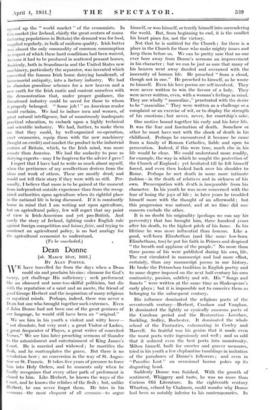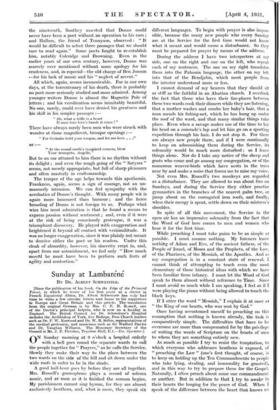Dean Donne
[ob. MARCH 31ST, 1631.]
BY ALAN PORTER.
WE have travelled far from the days when a Dean could sin and proclaim his sins : clamour for God's mercy, yet challenge His sufficiency ; seek preferment like an obsessed and none-too-skilful politician, but die with the reputation of a saint and an ascetc, the friend of good George Herbert and the inspiration of many religious or mystical minds. Perhaps, indeed, there was never a Dean but one who brought together such extremes. Even if John Donne had not been one of. the great geniuses of our language, he would still have been an " original."
We see him in his youth a violent and witty lover- " not dissolute, but very neat ; a great Visitor of Ladies, a great frequenter of Playes, a great writer of conceited VerseS." We see him later preaching sermons of thunder to the astonishment and entertainment of King James's Court. He is married and widowed ; he mortifies the flesh, and he contemplates the grave. But there is no revolution here ; no conversion in the way of St. Augus- tine or St. Francis. It takes five years of pressure to force him into Holy Orders, and he consents only when he filially recognizes that every other path of preferment is closed to him. Like Herbert, he knows the ways of the Court, and he knows the relishes of the flesh ; but, unlike Herbert, he can never forgot them. He tries in his sermons—the most eloquent of all sermons—to argue himself; or woo himself, or terrify himself into surrendering the world. But, from beginning to end, it is the conflict his heart pines for, not the victory. - Not that he is unfitted for the Church ; for there is a place in the Church for those who make mighty issues and keep them before us. We can be pretty sure that no one ever bore away from Donne's sermons an improvement in his character ; but we can be just as sure that many of his hearers went away dazzled and overawed with the insecurity of human life: He preached " from a cloud; though not in one." He preached to himself, as lie wrote to himself. Even his love poems are self-involved. They were never written to win the favour of a lady. They were never written, even, with a woman's feelings in mind. They are wholly " masculine ," penetrated with the desire to be " masculine." They were written as a challenge or a complaint or an exercise of wit, or to display the strength of his emotions ; but never, never, for courtship's sake.
One motive bound together his early and his later life. It was the fear and fascination of death. Somehow or other he must have met with the shock of death in his childhoods Perhaps he encountered it because he came from a family of Roman Catholics, liable and open to persecution. Indeed, if this were true, much else in his life would be clear. We could understand more readily, for example, the way in which he sought the protection of the Church of England ; yet hesitated till he felt himself forced, and even then looked back over his shoulder to Rome. Perhaps he met death in some more intimate fashion—in the death of relatives and in sickness of his own. Preoccupation with death is inseparable from his character. In his youth he was more concerned with the fear of losing the joys of life ; in later years he troubled himself more with the thought of an afterworld ; but this progression • was natural, and at no time did one concern exclude the other.
It is no doubt his originality (perhaps we can say his perversity) that has brought him, three hundred years after his death, to the highest pitch of his fame. In his lifetime lie was more influential than famous. Like a good, well-born Elizabethan (and like some low-born Elizabethans, too) he put his faith in Princes and despised " the breath and applause of the people." No more than three poems of his were published during his own. life. The rest circulated in manuscript and had more effect, certainly, than any manuscript poems in our history. He broke the Petrarchan tradition in English poetry and to some degree imposed on the next half-century his own contrariety, passion, subtlety and wit. His " Songs and Sonets " were written at the same time as Shakespeare's early plays ; but it is impossible not to conceive them as belonging to the subsequent century.
His influence dominated the religious poets of the seventeenth century—Herbert, Crashaw and Vaughan. It dominated the lightly or cynically amorous poets of the Carolean period and the Restoration—Lovelace, Suckling, Sedley, Rochester. It dominated the whole school of the Fantastics, culminating in Cowley and Marvell. So fruitful was his genius that it made even the worst poets write ingeniously and well ; and so odd that it seduced even the best poets into monstrosity. Milton himself, built for sweeter and graver measures, tried in his youth a few elephantine tumblings in imitation of the paradoxes of Donne's followers ; and even in " Paradise Lost an occasional horror pokes up its disgusting head.
Suddenly Donne was finished. With the growth of sentiment, Whiggery and taste, he was no more than Curious Old Literature. In the eighteenth century Wharton,. echoed by Chalmeis, could wonder why Donne had been so notably inferior to his contemporaries. In the nineteenth, Southey asserted that Donne could never have been a poet without an operation to his ears ; and Hallam, the friend of Tennyson, observed : " It would be difficult to select three passages that we should care to read again." Some poets fought to re-establish him, notably Coleridge and Browning. Even in the earlier years of our own century, however, Donne was scarcely ever mentioned without some apology for his crudeness, and, in especial—the old charge of Ben Jonson —for his lack of music and his " neglect of accent."
All which, again, seems inconceivable. For in our own days, at the tercentenary of his death, there is probably no poet more seriously studied and more admired. Among younger writers Donne is almost the Magnetic Pole of letters ; and his versification seems inimitably beautiful. No one, surely, could ever have denied his greatness and his skill in his simpler passages :- " Ah, what a trifle is a heart
If once into love's hands it come ! "
There have always surely been men who were struck with wonder at those magnificent, brusque openings :— " For Godsake hold your tongue, and let me love , ."
Or :— " At the round earth's imagined corners, blow Your trumpets, Angelis."
But to an ear attuned to him there is no rhythm without its delight ; and even the rough going of the " Satyres " seems, not merely appropriate, but full of sharp pleasures and often masterly in craftsmanship.
The temper of the age helps towards this apotheosis. Frankness, again, seems a sign of courage, not an un- mannerly intrusion. We can feel sympathy with the acrobatics of Donne's thought. With many people wit is again more honoured than humour ; and the fierce brooding of Donne is not foreign to us. Perhaps what wins him most admiration is that he found a means to express passion without sentiment ; and, even if it were at the risk of being consciously grotesque, it was a triumphant discovery. He played with exaggeration and heightened it beyond all contact with verisimilitude. It was no longer exaggeration, since it was plainly not meant to deceive either the poet or his readers. Under this cloak of absurdity, however, his sincerity crept in, and, apart from our astonishment, we feel only " How much moved he must have been to perform such feats of agility and contortion."









































 Previous page
Previous page